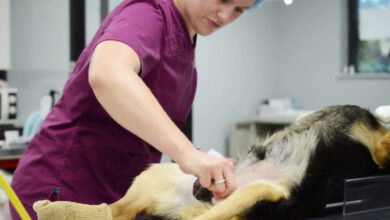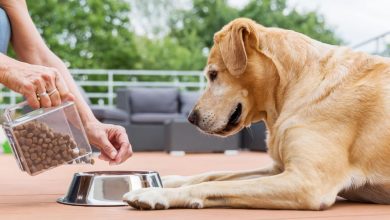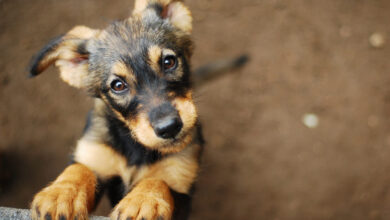Why Does My Old Dog Smell

1. Introduction
Old dogs can sometimes develop a smell that can be off-putting to their owners and those around them. This smell is often more noticeable in older dogs due to a number of factors, such as age, health, diet, and lifestyle. In this article, we will explore why old dogs smell and what can be done to reduce the odor.
2. What Causes a Dog’s Smell?
A dog’s smell is caused by a combination of factors, including bacteria, sweat, and oils. Bacteria are the primary cause of a dog’s smell and can be found on the skin, in the fur, and in the ears. Sweat and oils also contribute to the odor and are produced by glands located on the skin.
3. The Role of Bacteria in Dog Odor
Bacteria play an important role in a dog’s smell because they break down proteins and fats into volatile fatty acids (VFAs). These VFAs are what give a dog its unique odor. Bacteria also produce other compounds that can contribute to odors such as ammonia and sulfur compounds.
4. Why Old Dogs Smell More
Older dogs tend to have more bacteria on their skin than younger dogs due to decreased immunity as they age. This means that there is more bacteria breaking down proteins and fats into VFAs which contributes to a stronger odor. Additionally, older dogs may have weaker kidney function which can lead to increased urine odor.
5. How to Reduce Your Old Dog’s Smell
There are several steps you can take to reduce your old dog’s smell:
• Bathe your dog regularly with an appropriate shampoo for their coat type
• Brush your dog daily or at least every other day to remove excess dirt and oils from their fur
• Clean your dog’s ears regularly with an appropriate ear cleaner
• Feed your dog a healthy diet with plenty of fresh water
• Take your dog for regular vet check-ups
• Use an enzymatic cleaner or deodorizer specifically designed for pet odors
6. Diet and Nutrition for Older Dogs
A healthy diet is essential for older dogs as it helps keep their immune system strong and reduces bad smells caused by poor nutrition or digestive issues. Feeding your older dog a balanced diet with enough protein, carbohydrates, vitamins, minerals, and omega-3 fatty acids will help keep them healthy and smelling good. Additionally, make sure your old dog is getting plenty of fresh water throughout the day as dehydration can cause bad odors as well as other health problems.
7. Grooming Tips for an Older Dog
Grooming is important for all dogs but it is especially important for older dogs since they may not be able to groom themselves properly anymore due to age-related issues such as arthritis or vision problems. Regular brushing helps keep dirt and oils from building up on their fur which can contribute to bad smells. Additionally, trimming nails regularly will help reduce bad smells caused by overgrown nails trapping dirt or bacteria underneath them.
8. Cleaning Up After Your Older Dog
Cleaning up after your older dog is important not only for hygiene reasons but also for reducing odors caused by urine or feces being left behind in the house or yard. Make sure you clean up any messes immediately so that bacteria don’t have time to multiply which will reduce unpleasant smells over time.
9. Things to Consider When Dealing with an Older Dog’s Odor
When dealing with an older dog’s odor it is important to remember that some smells are normal while others may indicate an underlying medical issue such as infection or illness that needs attention from a veterinarian right away. If you notice any changes in your old dog’s smell it is best to consult with your vet right away so they can diagnose any potential health issues quickly before they become worse over time.
10 Common Questions About Old Dog Smells
Q: What causes my old dog’s smell?
A: The primary cause of most old dog smells is bacteria that breaks down proteins and fats into volatile fatty acids (VFAs) which give off odors unique to each individual animal. Other contributors include sweat and oils produced by glands located on the skin as well as poor diet or hygiene habits that allow bacteria or dirt/oils to build up on the fur/skin over time causing unpleasant odors .
Q: How do I reduce my old dog’s smell?
A: To reduce your old dog’s smell you should bathe them regularly using an appropriate shampoo for their coat type; brush them daily; clean their ears; feed them a healthy diet; take them for regular vet check-ups; use an enzymatic cleaner/deodorizer specifically designed for pet odors; groom them regularly; and clean up any messes immediately so that bacteria don’t have time to multiply which will reduce unpleasant smells over time .
Q: Is there anything else I should consider when dealing with my old dog’s smell?
A: Yes, it is important to remember that some smells are normal while others may indicate an underlying medical issue such as infection or illness that needs attention from a veterinarian right away so make sure you consult with your vet if you notice any changes in your old dog’s smell .



